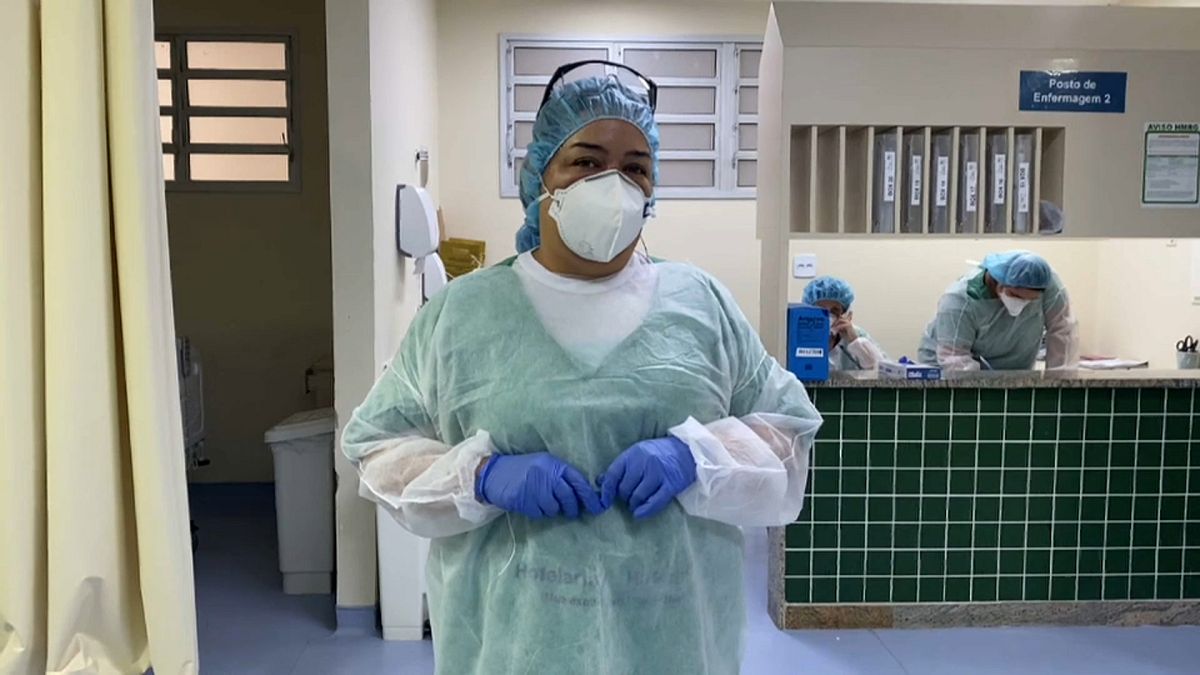Euronews was given access to a hospital in Rio de Janeiro, the city with the highest per capita coronavirus death rate in the country.
Brazil, the second worst-hit country in the world after the United States, has now passed the grim milestone of 200,000 COVID-19 deaths.
To get an idea of life on the coronavirus frontline, Euronews was given access to a hospital in Rio de Janeiro, the city with the highest per capita coronavirus death rate in the country.
The Ronaldo Gazolla Municipal Hospital was converted into a COVID-19 facility at the start of the pandemic last year. It has capacity for 380 critically-ill patients in ICU. The day we visited, 330 beds were occupied.
Before we went in to meet the government worker that was going to show us around one wing of the hospital, we spoke to an administration worker outside the facility. She agreed to talk to us on condition we didn’t reveal her identity.
She said this hospital had been hit hard by the pandemic and that what happened here was a symbol of the lack of preparedness Brazilian authorities showed - despite the pandemic hitting the country several months after cases were registered in Asia and Europe.
“There was one weekend where 65 people died. We had never seen such a thing. I had never seen such a thing. In the back, they had to put three containers to keep all the bodies”.
The containers are still placed on a large parking spot behind the hospital.
Inside the intensive care unit, exhausted doctors and nurses checked on 20 patients - most of whom were unconscious.
They were men and women, young and old.
“Here in Brazil we didn’t have a ‘type’ of person that got infected - the whole of the population got the virus and how the disease acted in people has been shocking to us,” said Dr Victor Augusto Azambuja, who’s been transferred from a field hospital where he cared for people during more of the crisis. The facility has now been shut by the city’s new mayor.
Azambuja said he lost count of the number of people he saw dying of COVID-19 last year: “I don’t know how to give you a number. Many people. Too many.”
The Ronaldo Gazolla Hospital registered 2,603 deaths last year - one person died there every 3 hours.
And the number includes healthcare workers.
Helenice Rodrigues Messner Neves works as a nurse at the facility and says she “lost many colleagues, many technicians and nurses as well... many health professionals have come to die with this disease. We didn’t have enough people showing up for work.”
Out of the more than 200,000 COVID-19 deaths registered in Brazil, at least 500 were nurses and technicians, according to the country’s health ministry.
Thirty of them have died since the start of the year, according to Brazil’s Federal Nurses Council.
In a country that is still scrambling to put together a cohesive response to the pandemic - and where the number of new COVID-19 cases continues to rise - Brazilian doctors and nurses faced a particularly difficult task.
Like in other parts of the world, at the start of the crisis they reported not having enough PPE, medicine or personnel to cope with the influx of patients
But unlike other countries, in Brazil, some had to do it without getting paid.
“We had cases of personnel that worked for over six months without receiving their salaries,” said Carlos Vasconcellos, a doctor who works in the state of Rio de Janeiro.
The president of the Union of Doctors of Rio de Janeiro, doctor Alexandre Telles said - throughout the pandemic - the state delayed healthcare personnel salaries and the unions had to file lawsuits against the local government in order for doctors and nurses to get paid. “And sometimes that happened through the confiscation of assets of the state,” Telles said.
He said it was the result of a convoluted system of outsourcing contracts designed at a federal level to cut costs.
“The system registers them as ‘legal entities’ in order not to grant them their working rights. We have received plenty of complaints of people who contracted COVID and didn’t even have the right to rest at home while keeping their salaries... some had to stay 14, 20 days without their salaries experiencing financial difficulties,” he said.
Others could not afford to stay home.
“Many went to work with COVID, sick with mild symptoms because if they missed that shift they would not be paid. This happened not only in Rio but all over the country” says Dr Vasconcellos.
Nearly one year on, and with no end in sight to the crisis, Brazilian doctors and nurses are exhausted.
“I don’t know how much longer we can carry on," said Messner Neves. "We are super tired of this war. All of us, health professionals are very tired. I don’t know how much longer we will be able to continue.“
